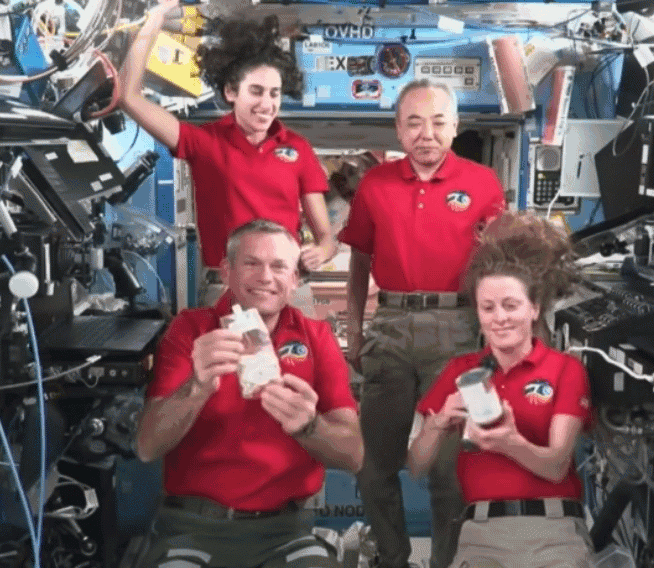
The crew on the International Space Station celebrates Thanksgiving. Credit: NASA
Astronauts aboard the International Space Station will be far away from family and friends this Thanksgiving but will still enjoy what sounds like a great meal.
The SpaceX Dragon spacecraft docked and delivered supplies Nov. 11 that included holiday treats for the Expedition 70 crew from NASA. This year’s menu includes turkey, duck, quail, seafood, cranberry sauce, kits to make pizza, hummus, salsa and olives. The crew can enjoy chocolate, pumpkin spice cappuccino, rice cakes, and mochi for dessert.
That’s not all. Oranges, apples, cherry tomatoes, carrots, and a selection of specialty cheeses were also prepped for the crew, said Dana Weigel, deputy program manager of the International Space Station Program, in NASA’s media teleconference for the SpaceX CRS-29 Prelaunch.
There’s quite a bit of science to eating in space. NASA explains it well in this video below.
The food is specially prepared at NASA’s Space Food Systems Laboratory to be nutritious, tasty, and safe to eat in space. It’s prepped and sealed in plastic packets to ensure a long shelf life. The food can easily be reheated or rehydrated.
Let’s look at some of the previous holiday meals celebrated in low-earth orbit, beginning with the first.
1976
The first Thanksgiving in space was celebrated aboard Skylab 4, which launched on Nov. 16, 1973.

Astronauts Gerald P. Carr, Edward G. Gibson, eating on SkyLab 4. Credit: NASA.
On Nov. 22, 1973, astronauts Gerald P. Carr, William E. Pogue, and Edward G. Gibson celebrated with two meals at dinner time after the team completed a spacewalk that took 6 hours and 33 minutes. The meals did not include any special items to celebrate the holiday.
Thanksgiving in space in the 1980s
The next time astronauts were in space for Thanksgiving was in 1985; this time, they indulged in festive foods. After launching into space aboard space shuttle Atlantis on Nov. 26, 1985, the crew shared shelf-stable turkey, cranberry sauce and shrimp cocktail.

Payload specialists Charles D. Walker, left, and Rodolfo Neri Vela of Mexico, of the STS-61B mission in 1985. Credit: NASA.
Meats eaten in space must be irradiated. The process reduces the number of foodborne pathogens and parasites in the meat, making it safe after being stored for months, per The Independent.
Tortillas, introduced by astronaut Neri Vela, were also on the menu and have become a staple in space since then. The flat food item does not drop crumbs, making it ideal for meals in zero gravity, according to a press release.
In 1989, the STS-33 crew celebrated Thanksgiving on the Discovery orbiter.
Thanksgiving in space in the 1990s
Two years later, in 1991, the STS-44 crew had a holiday dinner on the Atlantis orbiter. Astronauts aboard two different spacecraft in different orbits celebrated Thanksgiving in the mid-90s. STS-80 astronauts Kent V. Rominger, Tamara E. Jernigan, Story Musgrave, Thomas D. Jones, and Kenneth D. Cockrell shared a meal on the Columbia orbiter’s middeck. At the same time, NASA astronaut John E. Blaha celebrated Thanksgiving on the Russian space station, Mir, with cosmonauts Valeri G. Korzun and Aleksandr Y. Kaleri. Both crews exchanged holiday greetings over the radio. The occasion marked the most astronauts in space on Thanksgiving Day.
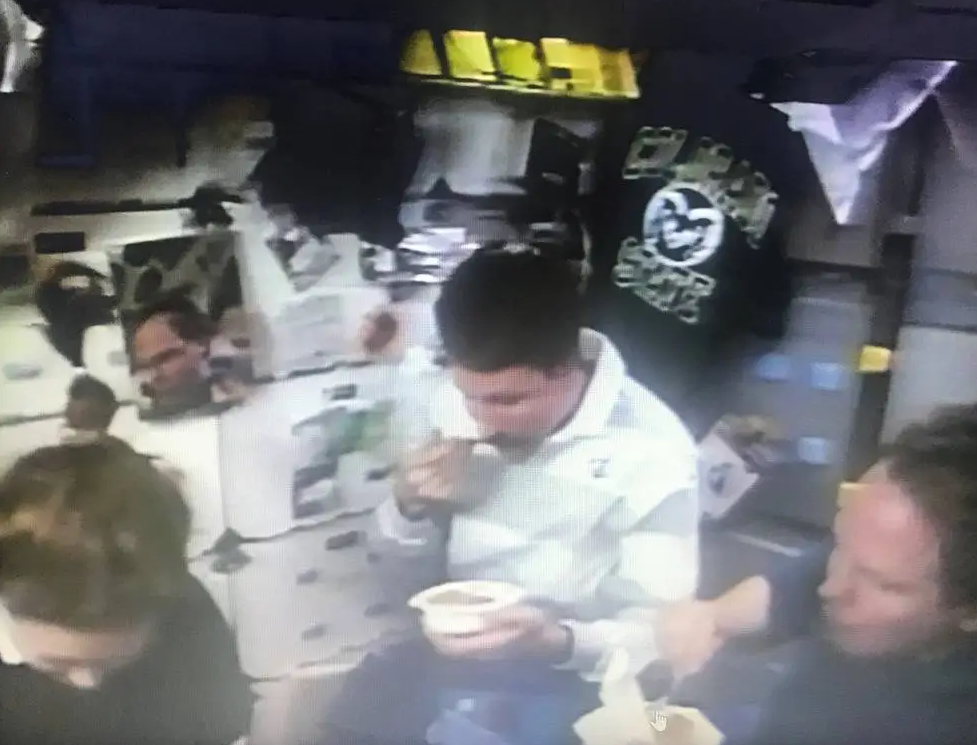
Astronauts Tamara E. Jeringan, Kent V. Rominger, and Thomas D. Jones on Columbia’s middeck, enjoy a Thanksgiving meal in 1996. Credit: NASA.
But the record was broken in 1997 when NASA astronaut David A. Wolf, Russian cosmonauts Anatoli Y. Solovev, and Pavel V. Vinogradov were on Mir. At this time, the STS-87 crew was also in orbit on the Columbia orbiter, setting the record for nine astronauts in space on Thanksgiving Day. The crew on Mir had milk, peas, freeze-dried mashed potatoes, and turkey.
The 2000s and beyond
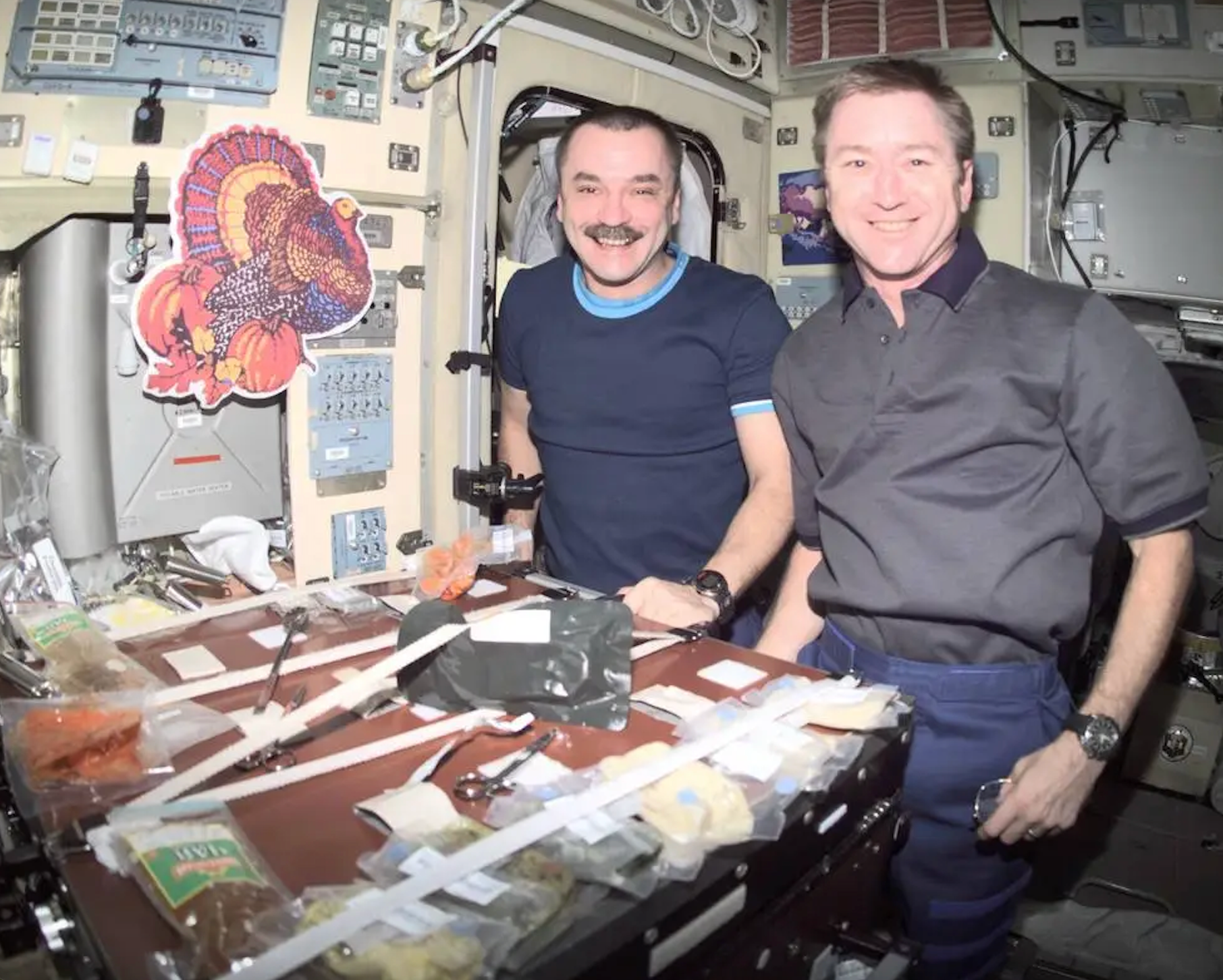
Expedition 3 crewmembers, Mikhail V. Tyurin of Roscosmos and NASA’s Frank L. Culbertson on the space station in 2001. Credit: NASA.
On Nov. 23, 2000, astronauts of the Expedition 1 crew celebrated the first Thanksgiving on the International Space Station. The meal included ham and smoked turkey. Since then, Thanksgiving is celebrated every November from space. In 2001, Expedition 3 crew members celebrated their holiday with a meal complete with a cardboard turkey decoration.
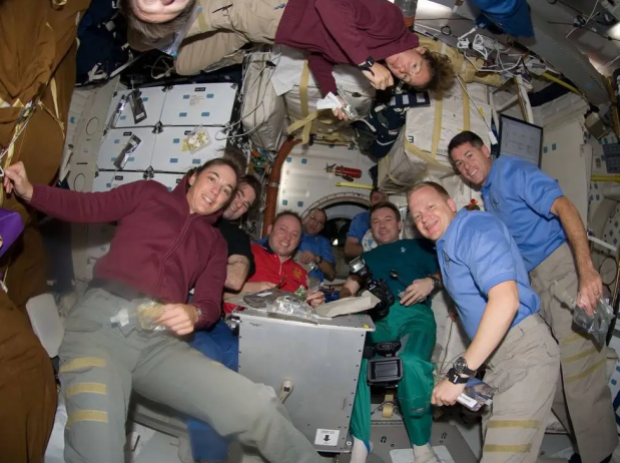
Expedition 18 and STS-126 crews having a Thanksgiving meal on the Endeavour orbiter in 2008. (Credit: NASA)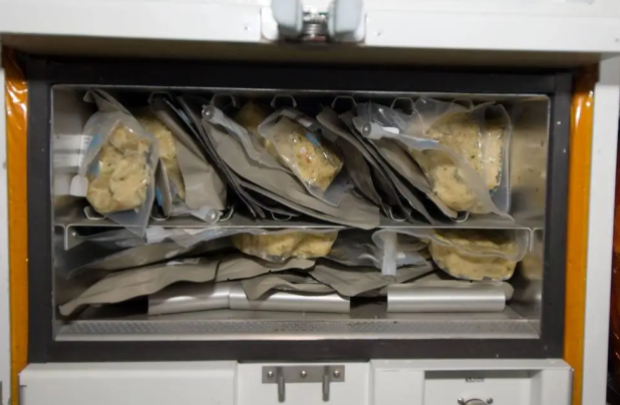 Reheating the Expedition and STS-126 crew’s 2008 Thanksgiving dinner on the Endeavour shuttle. (Credit: NASA)
Reheating the Expedition and STS-126 crew’s 2008 Thanksgiving dinner on the Endeavour shuttle. (Credit: NASA)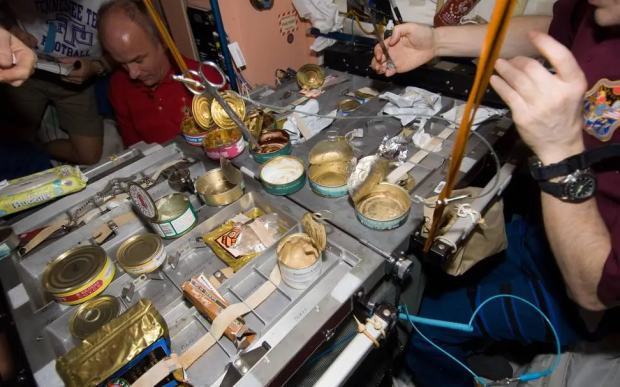
A view of the Expedition 21 and STS-129 crew’s 2009 Thanksgiving dinner. (Credit: NASA)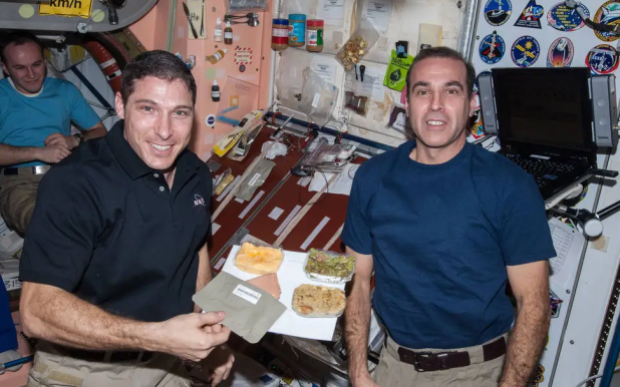
Expedition 38 astronauts Michael S. Hopkins and Richard A. Mastracchio with their Thanksgiving dinner in 2013. The items are turkey, mac and cheese, green beans, mushrooms and dressing. (Credit: NASA) 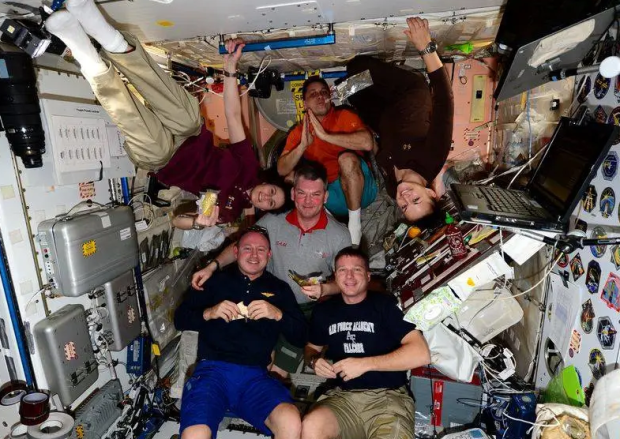
Expedition 42 enjoying their Thanksgiving dinner in 2014. (Credit: NASA)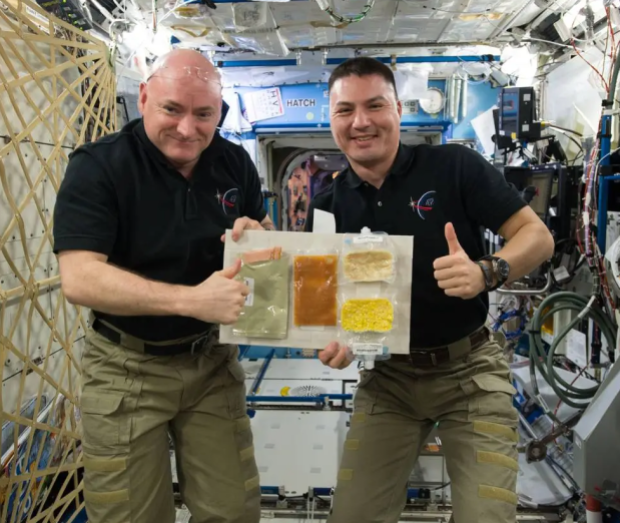
NASA astronauts Scott J. Kelly and Kjell N. Lindgren hold up their 2015 Thanksgiving dinner. (Credit: NASA)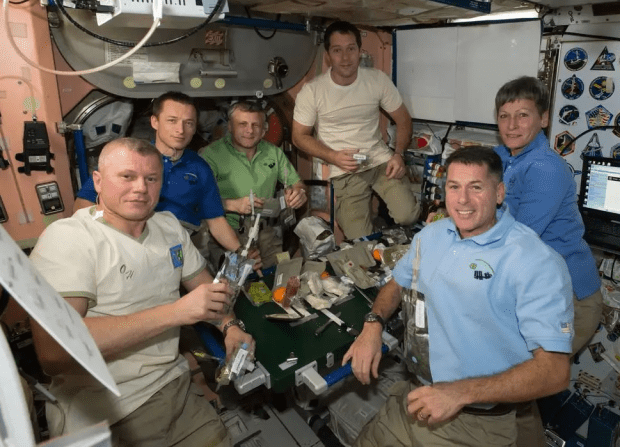
The Expedition 50 crew gathered for their Thanksgiving dinner in 2016. (Credit: NASA)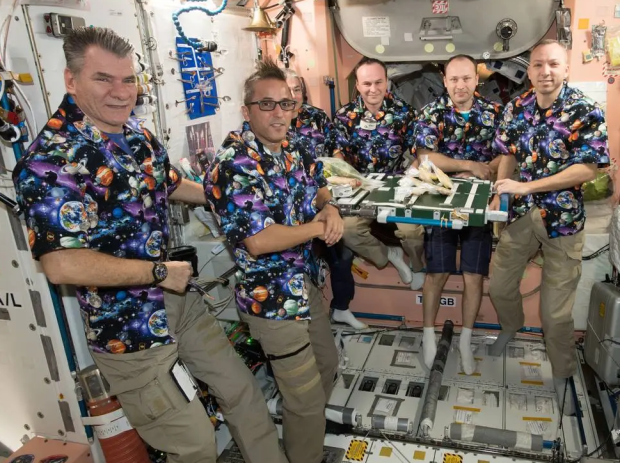
The Expedition 53 crew posing in front of their Thanksgiving dinner in 2017. (Credit: NASA)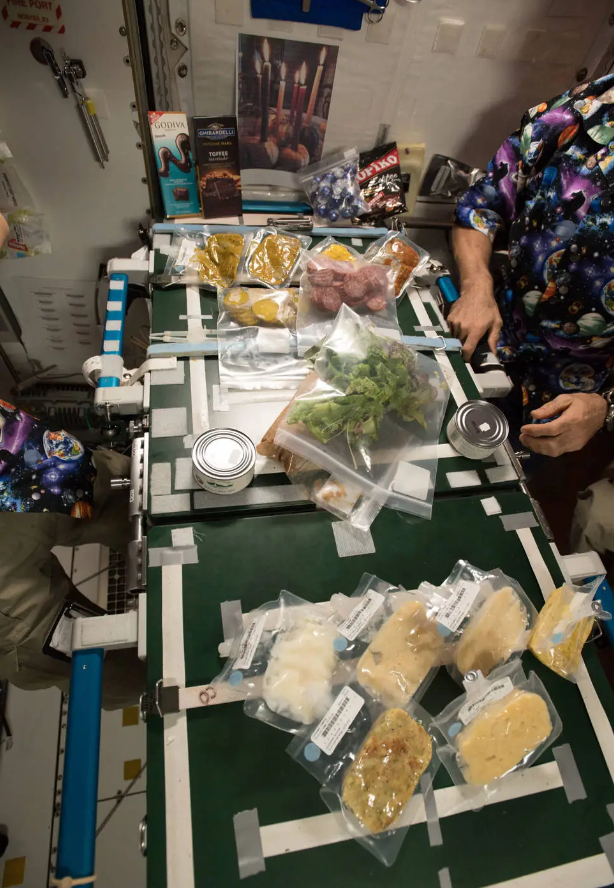
A close-up of the Expedition 50’s dinner. (Credit: NASA)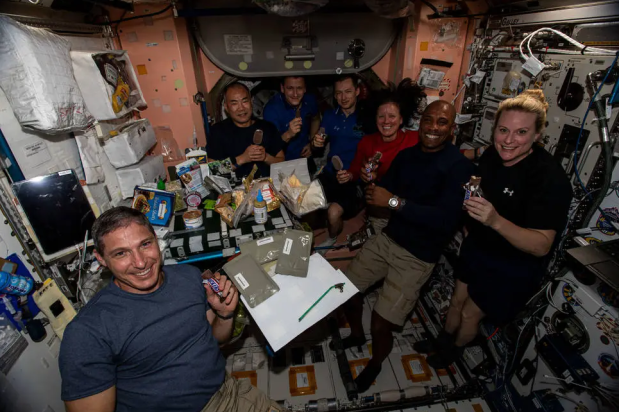
The Expedition 64 crew with their Thanksgiving dinner in 2020. (Credit: NASA)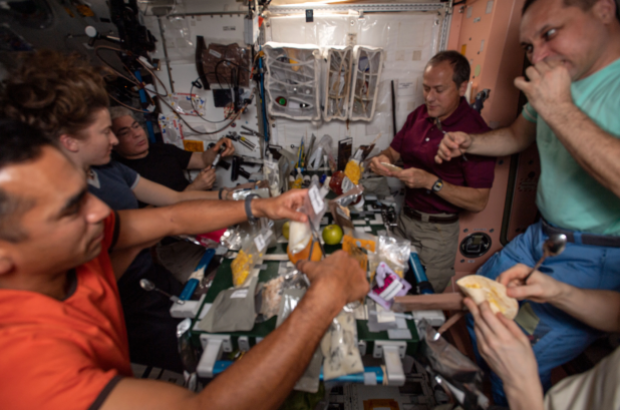
The Expedition 66 crew digging into their Thanksgiving feast in 2021. (Credit: NASA)
For 2002, STS-113 and Expedition 5 and 6 crews had a meal on the ISS of turkey, mashed potatoes, green beans with mushrooms, and blueberry-cherry cobbler for dessert.
In 2008, the Thanksgiving dinner was reheated in the space shuttle Endeavour’s food warmer. Expedition 18 and STS-126 crew members munched on candied yams, green beans, mushrooms, cornbread dressing, and a cranapple treat.
The following year, in 2009, 12 total astronauts from the STS-129 and Expedition 21 made up the most internationally diverse group on top of being the most number of astronauts in space that celebrated Turkey Day.
The crews celebrated the holiday two days early since the Atlantis orbiter was scheduled to undock on Thanksgiving Day. The teams represented the U.S., Belgium, Canada, and Russia.





